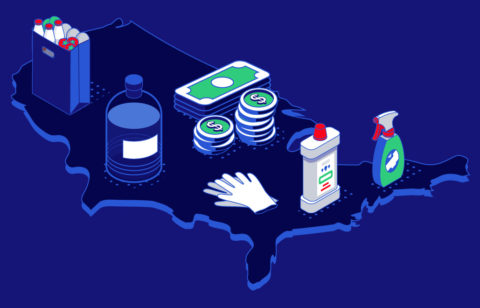Budgeting isn’t easy. Under the best circumstances, it takes a lot of dedication and determination. When you add a national emergency, it can be almost impossible. Face it; during the coronavirus pandemic, nearly everyone has been thrown into uncertain territories. People who had steady jobs for years have suddenly found themselves out of work or with their hours cut drastically. Many people are sick and unable to work. Even those who still have jobs have had their lives turned upside down. The uncertainty of this time has made it a necessity for most people to watch their spending and do some serious planning. This is how creating a good budget during the coronavirus pandemic can help, as so many people find themselves forced to survive on less money than before.
Find the Money
You need to get a clear picture of any money you have coming in right now so that you can set an effective budget.
Look for a Job
Many jobs can be done from home, and although there’s obviously a lot of competition currently, it’s still possible. If you have skills in writing, graphic design, computer programming, or tutoring, for example, many resources are available for remote work. Even if you can only find a side job, it’ll bring in much-needed income during the crisis. However, working even a part-time job could affect your unemployment benefits, so it’s best to check with your local unemployment office for guidelines and factor this into your budget during the coronavirus pandemic.
Apply for Unemployment Benefits
Make sure that if you’re eligible for unemployment benefits, you’ve applied and are following the instructions to the letter. Failing to update weekly could disqualify you. Unemployment numbers have smashed all-time high records, more than 6.5 million as of the end of March. A stimulus package was passed that could see a one-time $1,200 payment in the hands of most Americans in April or May, plus an extra $600 per week for four months to people on unemployment. Married couples with children could also receive a one-time payment of $500 for each eligible child.
File Your Taxes
If you’re getting a refund, do your 2019 state and federal taxes if you haven’t already done so. If you owe money, the good news is that the deadline to file has been pushed out to July 15, 2020, but if we near that date and you’re still out of work, you should consider filing for an extension.
From all this, calculate your monthly income.
Cut Expenses
Eliminate expenses down to core necessities. Remember, this doesn’t have to be permanent, but desperate times call for desperate measures.
Cancel Subscriptions
Cancel any monthly subscriptions for magazines, music apps, etc. If you’ve lost track, Truebill can help you find and cancel ones you may have forgotten about.
Find State Assistance
Look for resources in your state to see if you qualify for SNAP for food assistance or other assistance.
Contact Your Creditors
Call your creditors and ask if they’re offering any kind of deferment assistance, including your landlord or mortgage company, credit card companies, and utility companies. If your lenders aren’t offering any kind of relief for unemployed consumers, try them again in a week. Things are changing every day; in some cases, the government is stepping in and ordering lenders and creditors to change their policies and offer temporary relief.
Cut the Cable
Cut or scale back on cable or streaming services, but keep in mind that you’ll need some kind of entertainment while everyone’s being told to stay at home. You may consider them a necessity to your budget during the coronavirus pandemic.
Cut Discretionary Spending
Although the pandemic has made creating a budget essential, in some ways, it’s made it easier. It’s eliminated most discretionary spending. No more vacations, no more going out to dinner, no more shopping for anything other than food. If you’ve turned to online shopping, only buy things you absolutely need during this time. Remember, the people filling and delivering the orders are putting themselves at risk, so keep it to only things you need for now.
Plan Your Meals Ahead of Time
Plan your meals ahead of time using cheap ingredients such as canned soups and frozen veggies. Additionally, buy larger packages of meats and break them down into smaller packages to freeze. It’s also a perfect time to use all those long-forgotten items in your pantry.
Add It Up
Once you have a clearer number for your monthly expenses and bills, you can subtract your expenses from your income to see if you’ll have enough to cover it all at the end of the month. If you have anything in your savings or emergency fund, now may be the time to dip into that to make ends meet; or, look for other places to cut expenses. A free budget worksheet from National Debt Relief can be downloaded here, simplifying the process of making a budget during the coronavirus pandemic.
The COVID-19 pandemic has made careful spenders of us all. History has taught us that difficult times, whether they’re because of personal issues or a national crisis, don’t last forever. With perseverance, we’ll come out on the other side having learned a lot.





